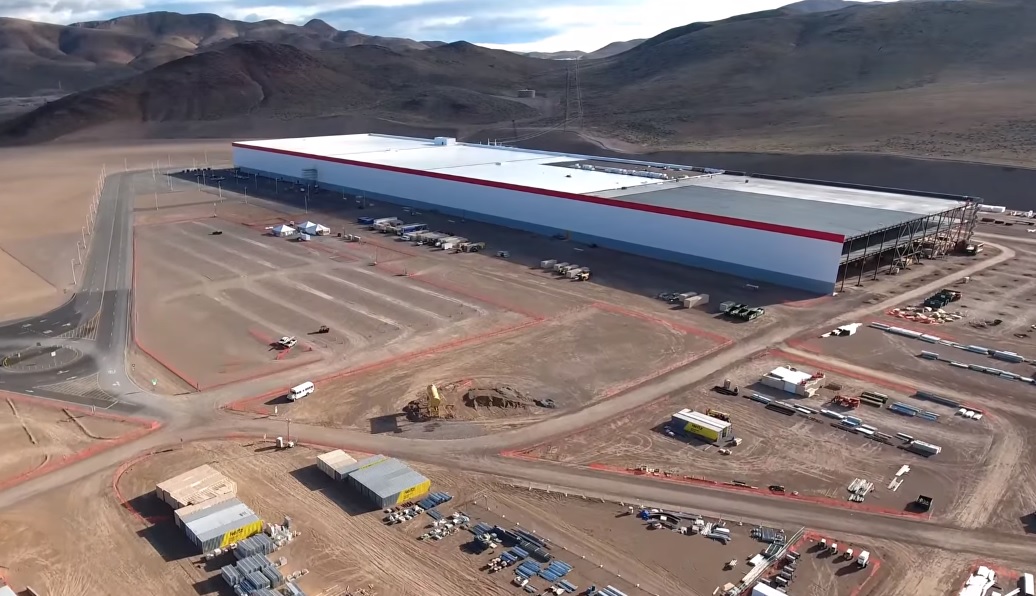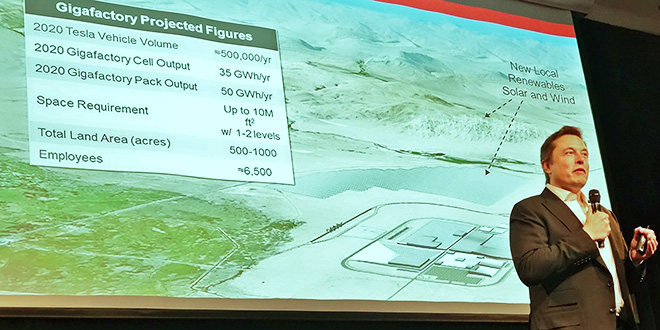I'm continuously intrigued about Tesla and Elon Musk. I believe that Elon Musk is one of the most dynamic entrepreneurs, innovators, and inventors today--possibly one of the greatest of the 21st Century. Here's a guy who sold PayPal to eBay for a bountiful $1.5 Billion and instead of leaving the world for a career in hedonism, he used his profit to bankroll a personal vision for space travel and sustainable energy: the latter, saving the world from inefficient, expensive energy, and the former saving the world from nuclear war--or at least providing an exit strategy for earthlings.
 |
| Gigafactory: thought your Costco was big? |
But while Musk's vision may be humanistic on the surface, underneath one can't help but see a vanishing of human beings in a way that seems disquieting, even creepy.
The late American inventor Buckminster Fuller called factory waste "misguided energy." This is the way great inventors think--they find ways to redirect waste to practical, revenue-generating ends. As I've reported in an earlier post, Musk's Master Plan includes a way for Tesla vehicles to form a fleet that transports people to their destination. But this isn't just any fleet; it's a fleet made up of vehicles that would otherwise be sitting stagnant in office parking lots across the continent--this is the redirection of waste; for instead of the potential of the vehicle being wasted in a parking lot, it can be put to use to transport people around the city. But that's not all: as part of the fleet, the vehicle would be generating revenue back to the owner, thus paying down the price of the vehicle itself. Moreover, the vehicles will be run on clean battery power, which will radically cut down on noxious vehicle exhaust (waste) that creates smog and other health problems.
But there is a part of the waste-mitigation vision of Tesla that seems somewhat troubling, namely the redirection of human resources. One could argue that a fleet of driverless cars is a benefit to humanity by removing the need for human potential to be 'wasted' on operating a vehicle. Someone like Musk might argue that the human potential used in operating a vehicle could be better used to solve global problems or design new things. Nevertheless, transportation has been a reliable way for people to sustain a living for centuries. A vision that takes this form of work away from humans shows almost a disdain for them.
In fact, there doesn't seem to be a human element to Tesla's vision at all--not just in the operation of the fleet, but even in the very manufacturing of the vehicles itself.
Teslas's answer to Job's vision of a new Apple head office is the Gigafactory--the second largest building in the world. The Gigafactory will be the megaplex for the manufacturing of Tesla vehicles--Musk calls it "the machine that makes the machine." But for Musk, the Gigafactory production line will be operated solely by robots. Robots, according to Musk, are fast, clean, and efficient--humans simply aren't. If humans are used to manufacture the vehicles, then production will slow down to what he calls "people speed," and that's just not good.
An inside look at the Gigafactory
One problem with this is while Musk is claiming to help humankind by creating these autonomous vehicles that will transport them everywhere, he's taking a lot of potential jobs out of their hands. Like transportation, manufacturing has been a solid form of employment for over a century; but for Musk, the end (speed, efficiency, performance) justifies the means. Think of how many people the Gigafactory could employ if humans were the operators of the manufacturing process. But that's just a minor problem for humanity--there lies an even greater one under the surface of an overall optimism about "the machine" itself.
Musk has been part of a group of top thinkers warning the world about highly advanced artificial intelligence. He believes that we will have killer robots in the next 5-10 years; and that the world isn't taking the rise of machines seriously enough. In fact, his SpaceX solution seems to have the potential of a robot war in mind. In spite of this area of foresight, Musk seems to be overlooking the potential of "the machine that powers the machine" becoming self-aware and driving (pardon the pun) a rogue agenda--the solution for human transportation actually becoming a big part of the problem that seeks to annihilate humankind itself.
What stops a factory larger than 95 football fields and bursting at the seams with highly advanced robotic technology from advancing to consciousness? Seems far-fetched? Well so does heating up Mars by launching thermonuclear bombs into its poles--a solution Musk maintains is plausible. How is it that the Gigafactory is robotically benign when it's potential is lauded as so advanced? When you look at the exponential growth of technology, this scenario is more than merely plausible.
And while Musk may be a humanitarian guy with visions of being the superhero, what if something happens to him and the Gigafactory suddenly succumbs to a villain despot who turns the technology against humankind itself? Implausible? No.
Elon Musk might be a super villain...
Musk has to have these scenarios in mind, and most likely does--but he's holding his cards tightly.
You think I'm overreacting?
Want to know another name Musk recently called the Gigafactory?
"Alien dreadnought"--
No joke!
In Musk's own words, deftly quoted by the Washington Post,
"It's like, what the hell is that?"


No comments:
Post a Comment